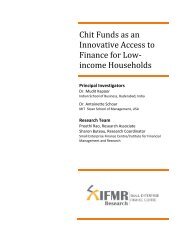Government of India Volume I: Analysis and Recommendations
Government of India Volume I: Analysis and Recommendations
Government of India Volume I: Analysis and Recommendations
You also want an ePaper? Increase the reach of your titles
YUMPU automatically turns print PDFs into web optimized ePapers that Google loves.
ANNEXES<br />
19. Role <strong>of</strong> surveyors:<br />
(a) The <strong>India</strong>n Institute <strong>of</strong> Insurance Surveyors <strong>and</strong> Loss Assessors should be given<br />
statutory recognition as a pr<strong>of</strong>essional body responsible for the licensing <strong>and</strong><br />
supervision <strong>of</strong> surveyors <strong>and</strong> loss assessors.<br />
(b) In order to protect the interests <strong>of</strong> consumers, the legal framework should allow<br />
them to appoint a surveyor in addition to the surveyor required to be appointed<br />
by the insurer. The insurer will be required to consider both reports<br />
before making a decision on the claim.<br />
20. The law should empower the regulator to specify the types <strong>of</strong> permitted <strong>and</strong> restricted<br />
assignments <strong>of</strong> insurance policies. The insurer will not have the discretion<br />
to refuse to record an assignment that is made in accordance with the regulations.<br />
Competition issues<br />
21. The legal framework governing LIC should be at par with the laws applicable to all<br />
other life insurance companies. In particular, there should be no sovereign guarantee<br />
for the policies <strong>of</strong> LIC. The status <strong>of</strong> LIC should be changed from a statutory corporation<br />
to a <strong>Government</strong> company governed under st<strong>and</strong>ard company law provisions.<br />
22. There is a need for encouraging competition in the reinsurance sector by adopting<br />
the following measures:<br />
(a) do away with the m<strong>and</strong>atory requirement placed upon general insurance<br />
companies to reinsure a portion <strong>of</strong> their business with General Insurnace Council<br />
(GIC);<br />
(b) remove barriers which prevent <strong>India</strong>n insurance companies from doing business<br />
with global reinsurers, subject only to prudential regulation requirements;<br />
<strong>and</strong><br />
(c) create an enabling framework for the entry <strong>of</strong> global reinsurance firms, including<br />
Lloyds, in the <strong>India</strong>n reinsurance sector.<br />
23. Competition policy should play an effective role in ensuring that government schemes<br />
do not create an uneven playing field between state-owned <strong>and</strong> private insurance<br />
companies.<br />
Resolution <strong>and</strong> systemic relevance<br />
24. The law should contain appropriate resolution mechanisms to deal with failing<br />
insurance firms, including provisions for enhanced supervision <strong>and</strong> the option <strong>of</strong><br />
transferring the business <strong>of</strong> the failing insurer to a solvent insurer. These mechanisms<br />
should be applicable to both life <strong>and</strong> non-life insurers.<br />
25. There is a need to create a compensation scheme to protect policyholders from<br />
the inability <strong>of</strong> an insurer to meet its financial obligations <strong>and</strong> to minimise the taxpayer’s<br />
exposure to the failure <strong>of</strong> insurance firms. The design <strong>of</strong> the policyholder<br />
compensation scheme should be decided under the resolution framework being<br />
designed by the Commission.<br />
26. It should be the regulator’s responsibility to assess the systemic importance <strong>of</strong> individual<br />
insurance firms. Additional supervisory <strong>and</strong> resolution tools will need to<br />
be employed in respect <strong>of</strong> those insurance companies that are found to be systemically<br />
important.<br />
Unregulated areas <strong>of</strong> insurance<br />
27. Establishments covered by ESIC should have the option to opt out <strong>of</strong> the medical<br />
benefit facilities provided under the scheme <strong>and</strong> obtain group health insurance<br />
coverage <strong>of</strong>fered by an insurance company, if they are able to obtain similar benefits<br />
at a similar cost . In such cases, a proportionate amount <strong>of</strong> the total contribution<br />
payable to ESIC that relates to the medical benefits provided under the scheme will<br />
be used as the premium for obtaining the insurance policy.<br />
FINANCIAL SECTOR LEGISLATIVE REFORMS COMMISSION 169



